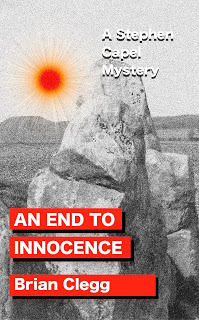
The latest self-pubbed Capel
novel,
An End to Innocence
I've been a professional writer for over 20 years, but when I first started to get into writing, I wrote a number of novels which, despite getting positive feedback from publishers, never made it into print. For a long time they languished in the electronic equivalent of the back of a drawer, but the relative ease of modern self-publishing made me wonder if it was worth digging them out - and it has been a really positive experience.
I've now published five of my Stephen Capel detective novels - three written way back when and just updated to introduce trendy aspects such as mobile phones, plus two written over the last couple of years. I used Amazon's
Createspace platform, and though it appears somewhat overwhelming to start with, if you take it steadily it is surprisingly painless.
For the interior of the book, I've used the Createspace formatted Word template on offer to download, which provides a very professional looking layout. The default page size is 6x9, but that's rather large for a typical mass market paperback, so I opted instead for 5x8. One early lesson from getting a printed proof is to go for cream paper rather than white, which yells 'self published' at the reader.
Similarly, for the cover I made use of a template - the PDF version - which I read into my graphics editor and used as a backdrop layer to set up the cover. It is possible to use a built-in cover designer on Createspace, but assembling your own allows for a lot more flexibility.
Once you've got the basics in, it's really important to print off a proof copy, both to make sure the layout works well and so someone else can proofread it - one thing the professional publishing process has hammered into me is that it's very difficult to spot all the mistakes in your own writing, and a proofreader makes all the difference.
Then it's just a matter of a final on-screen check and pressing the button to get publication in motion. (There's a bit more fiddling around over pricing and distribution, but it's straightforward.) You can have a finished copy of your book dropping through the letterbox within a few days. And your book can get to your readers even faster as a few more clicks sends it through to KDP - the Kindle development platform, providing a professional ebook finish, again via Amazon. One useful tip here picked up from the pros, is it's a good idea to do a slight variant on your book interior for the Kindle version, moving the copyright page to the back of the book.
Then all you have to do is make the world aware of your book - the hardest part, I suspect. I've had very positive feedback from readers who aren't friends and relations - but it is difficult to become visible in this kind of market. Even if the books don't become bestsellers, though, it's great that there's a chance for people to see them rather than leave them at the bottom of that fusty virtual drawer.
If you're interested, you can
see all my fiction offerings here, mostly at the bargain prices of £6.99 for a paperback and £1.99 for a Kindle copy.
 newest »
newest »
 newest »
newest »
 Thanks, Brian This is helpful information. I'm working on a book and plan to publish it on Amazon when completed. I read your non-fiction book about time travel and really liked it.
Thanks, Brian This is helpful information. I'm working on a book and plan to publish it on Amazon when completed. I read your non-fiction book about time travel and really liked it.
 Frank wrote: "Thanks, Brian This is helpful information. I'm working on a book and plan to publish it on Amazon when completed. I read your non-fiction book about time travel and really liked it."
Frank wrote: "Thanks, Brian This is helpful information. I'm working on a book and plan to publish it on Amazon when completed. I read your non-fiction book about time travel and really liked it." Editing one's own writing - beyond a 1000 words or so - seems a special kind of hell on earth.
Editing one's own writing - beyond a 1000 words or so - seems a special kind of hell on earth.  Jim wrote: "Editing one's own writing - beyond a 1000 words or so - seems a special kind of hell on earth.
Jim wrote: "Editing one's own writing - beyond a 1000 words or so - seems a special kind of hell on earth. 



